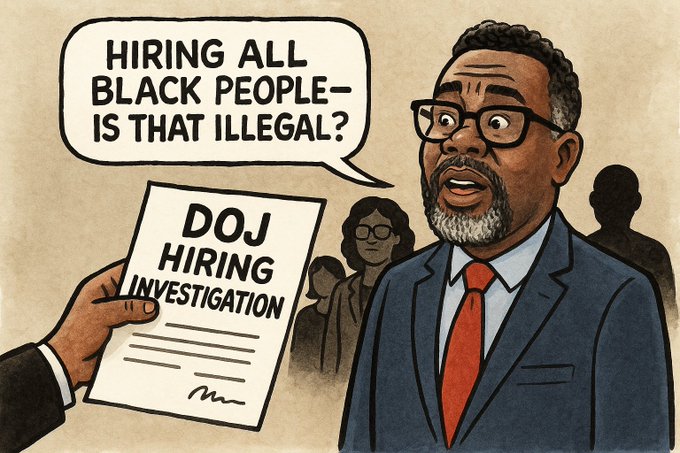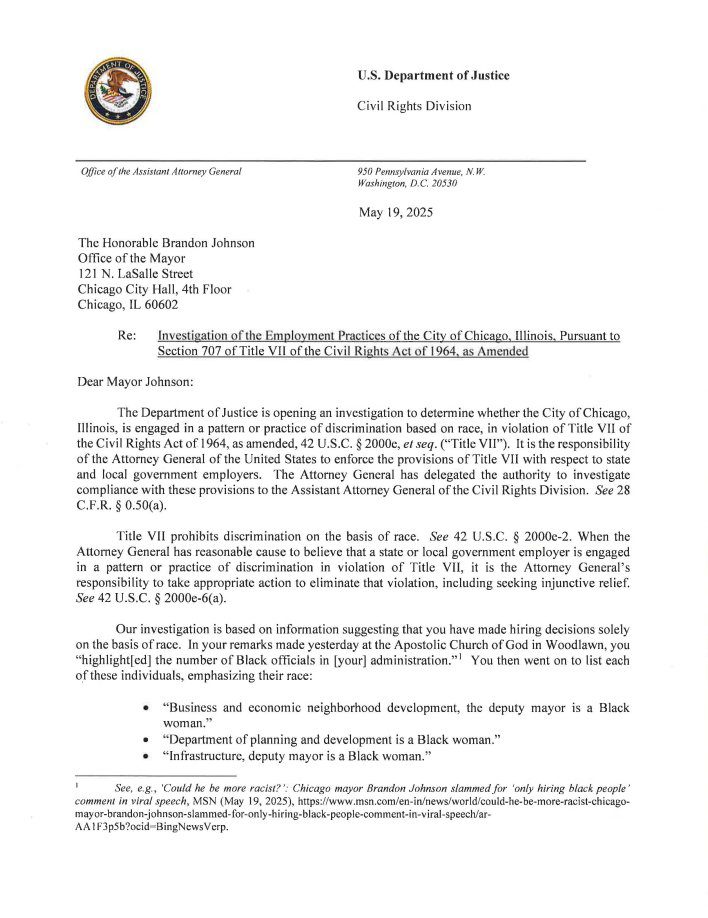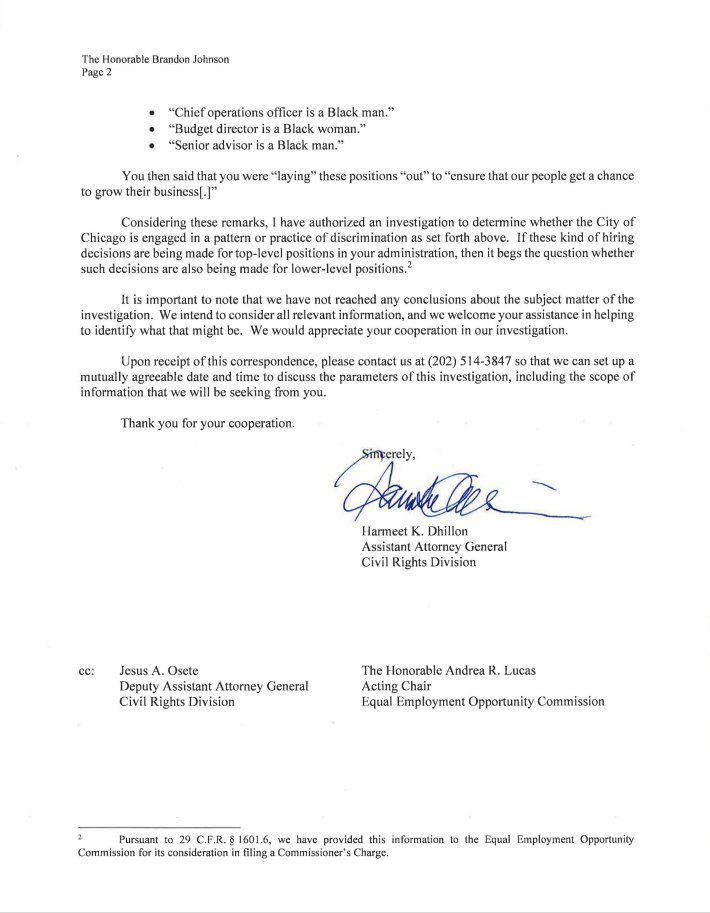
The U.S. Department of Justice has launched a formal investigation into the hiring practices of the administration of Chicago Mayor Brandon Johnson, after a public speech in which he boasted that top city positions are filled entirely with Black individuals, mostly women.
In a May 19, 2025, letter to the City of Chicago, the DOJ’s Civil Rights Division requested personnel records, meeting logs, hiring justifications, and emails as part of a Title VII investigation into what it calls a possible “pattern or practice” of unlawful discrimination in hiring. The investigation is rooted in the federal Civil Rights Act of 1964, which prohibits employment discrimination based on race, color, religion, sex, or national origin.
“If these kinds of hiring decisions are being made for top-level positions,” the DOJ letter states, “it begs the question whether such decisions are also being made for lower-level positions.”
The inquiry centers on remarks made by Mayor Johnson at a South Side church in early May, where he outlined that key positions in planning, budgeting, infrastructure, and city operations are now held by Black Chicagoans. “For the first time in the history of Chicago,” Johnson declared, “Black people are in charge of city government.”
The mayor also emphasized that this leadership team “has made it a point to make sure our people get a chance to grow their businesses” — a statement the DOJ is treating as possible evidence of race-conscious policy in violation of federal law.
From Machine Politics to Race Politics?
The stakes go beyond one mayor’s speech. Chicago has a long and infamous history of using city jobs as currency — under the table and along political lines. That era was challenged by a decades-long court battle that gave rise to the Shakman Decrees, a series of federal court rulings that prohibited political patronage in hiring and firing for most city jobs.
Filed originally in 1969 by attorney Michael Shakman, the case culminated in a 1972 court order that dismantled the “machine” system in which loyalty to the Democratic Party controlled employment decisions across city departments. Over time, court oversight expanded into detailed consent decrees that required independent monitoring of city personnel practices.
Even today, the Shakman Monitor continues to provide oversight, publishing reports and auditing compliance with merit-based hiring.
Now the Department of Justice appears to be testing whether racial favoritism could be treated as a modern counterpart to the old patronage system.
“Shakman was about rooting out a political spoils system,” said a legal scholar familiar with the case. “The DOJ may now be asking whether race-based equity hiring creates a similar kind of exclusion — just with a different gatekeeper.”
This is not hypothetical. In his own article, “Shakman on Shakman: Chicago Is Ready for Reform,” the attorney warned that court-enforced equity must remain neutral — or risk perpetuating new forms of injustice.
A Progressive Pivot with Legal Peril
Mayor Johnson, a former teacher and union organizer, was elected on a progressive platform that included restorative justice, public investment in disinvested communities, and racial equity in city governance. His administration argues that filling positions with qualified Black professionals is a corrective, not a violation — a way to right historic wrongs in a city long dominated by white leadership.
But legal experts point to the Ricci v. DeStefano precedent, where the Supreme Court ruled that employers cannot discard employment standards or decision-making processes based solely on racial outcomes without a “strong basis in evidence” that a civil rights violation would otherwise occur.
“It’s not enough to say the system was unfair,” said a constitutional law professor. “You can’t just replace one exclusionary practice with another.”
The DOJ’s request covers a broad range of documents dating back to the start of Johnson’s term in 2023. In addition to looking at hiring for executive-level positions, investigators want to know whether the city engaged in system-wide racial filtering — in direct or indirect ways — for lower-level posts, consulting contracts, and agency appointments.
Shakman Lives
The revived relevance of the Shakman Decrees is not lost on those familiar with Chicago history. In her landmark 1988 article, Ann Freedman described how the decrees succeeded in undermining the “patronage army” and replacing it with civil service procedures that emphasized merit.
That same year, C. Richard Johnson called the litigation “one of the most successful civil rights cases in the federal courts.”
But critics now wonder whether “equity” has become the new “machine” — a justification for behind-the-scenes favoritism that only feels more virtuous.
“It used to be you had to know a precinct captain to get a job,” said one longtime city worker. “Now, it seems like you just need to be part of the right racial coalition.”
Mayor Johnson has not publicly responded to the DOJ’s investigation, and no charges have been filed. But federal investigators have begun reviewing public statements, campaign materials, and internal HR documents. If the probe finds a consistent racial pattern in hiring — even one done under the name of justice — it could trigger a consent decree, loss of federal funds, or litigation.
see our write up on the new machine
the New Machine, Gonna be hard to Beat
May 19, 2025
https://facebook.com/share/p/1GFzfydX5g/
References (DRS Format)
‘Could he be more racist?’ Chicago Mayor Brandon Johnson slammed for ‘only hiring black people’ (19 May 2025) Times of India
http://timesofindia.indiatimes.com/articleshow/121265000.cms
Doing Battle with the Patronage Army: Politics, Courts, and Personnel Administration in Chicago (September–October 1988) Public Administration Review
DOJ Civil Rights Division Investigation Letter (19 May 2025) US Department of Justice
https://justice.gov/crt/media/1400811/dl?inline
DOJ Investigates Chicago Hiring Over Racial Claims (19 May 2025) NBC Chicago
https://nbcchicago.com/news/local/doj-investigates-chicagos-hiring-practices-following-comments-by-mayor-johnson/3749322/
The Federal Courts and the Community: Successful Reform Litigation: The Shakman Patronage Case (1988) Chicago-Kent Law Review
Shakman Decrees Entry (n.d.) Encyclopedia of Chicago
http://encyclopedia.chicagohistory.org/pages/1138.html
Shakman Monitor Homepage (2025) http://ShakmanMonitor.com
http://shakmanmonitor.com
Shakman on Shakman: Chicago Is Ready for Reform (May 1983) Chicago Lawyer


